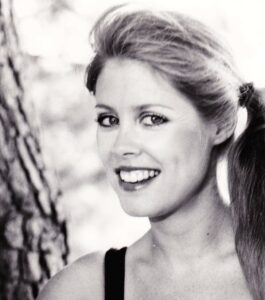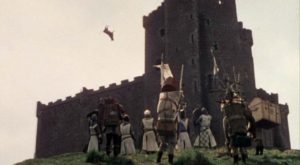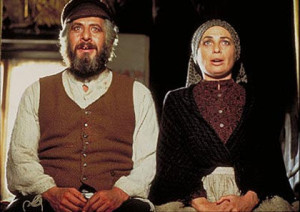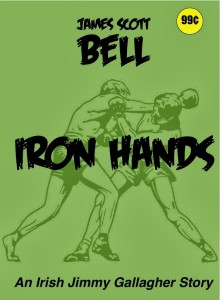Back in 2016 when I was working on the first two novels in the Empowered series and taking a self-study crash course in indie publishing, “writing to market” was the topic d’jour in indie author circles and on self-publishing podcasts. Chris Fox’s Write To Market laid out how to do this. I have indie author friends who were adroit at figuring out the tropes and trends in their particular sub-genre and successfully hit their particular market’ bull’s-eye.
Contrast that with advice I’d read years before, from agents and editors, to be aware of the market, but not chase it, since you’ll always be behind. Instead write the story that you most want to tell, which still seems like very sound advice. Another way of putting it is to know the reader expectations of your particular genre, but first and foremost, write what you love. Finding the place on the publishing Venn diagram where those expectations and what you love intersect can connect you with readers.
Today’s Words of Wisdom looks at the importance of writing “for the love of it.” Rather than the usual trio of excerpts we have a quartet of briefer ones on writing what you love, the different kinds of love you need, how writing what you love can rejuvenate and power your writing, and how love for a project can be a vital factor in your success. Two are from JSB, since they build nicely off each other. Even more than usual, given the short length of the excerpts, it is worth checking out the full versions, which are linked at the bottom of their respective enteries here.

I thought I’d follow on from Jim’s terrific post yesterday about writing with heart, and discuss an issue that is just as important in my view – writing what you love and not what you think the market will love. It drives me crazy when people say “you should write a romance – you’d make more money that way” or (even weirder) “You should write erotica – it’s really hot (no pun intended) right now.” For some reason there always seem to people wanting to make ‘helpful suggestions’ on what you should write – usually by pointing out the ‘hot’ genre on the current bestseller list, as if that is all it takes. Hey, if you just added a paranormal element to your mystery, shazam, you’d have it made.
If only it was that easy…For many wannabe writers the thought of becoming the next J K Rowling or Stephenie Meyers is enticement enough, as is the belief that somehow if you write to what you think the market wants, your future will be secure. Wrong.
Setting aside the obvious (that by the time you’ve written what the market loves now, the market has already shifted to something else) there is something more fundamental at stake. As my agent always says, you must write what you love. Why? Because it shows.
It shows if you are writing a romance when you think it’s ‘easy money’. It shows if you write a YA fantasy when you really want to write contemporary thrillers…If your heart isn’t in it, the readers will know you’re faking it.
Clare Langley-Hawthrone–June 14, 2010
The world is full of entertaining distractions, and many of them would give me more pleasure than writing my novel would, at least in the short term. Yet I convince myself that this isn’t true. I put down my newspaper and tell myself, “You know what? My novel is more interesting than the CIA director’s scandalous affair. So what, the guy fooled around with a fawning younger woman, what’s so interesting about that? Come on, stop searching the Internet for lubricious details. Stop exchanging snarky e-mails with your friends. Get back to work!”
And this brings me to the second lie I tell myself. At some point in the process of writing a novel I become convinced that this book is the best thing I’ve ever written. No — the best thing ever written by anybody. Crazy, right? The lie is so absurd I can’t seriously entertain it for very long. But it’s a useful delusion to have, especially when I’m struggling with the book and the deadline is approaching and I have to devote practically every waking moment to finishing the damn thing. Why put in all the effort if the novel isn’t fantastic?
Then I finish the first draft and stop telling myself the lies. They’ve served their purpose, so I don’t have to believe them anymore. I wait a few weeks, and then I’m ready to look at the manuscript again and confront the truth: the book is a mess. Some parts don’t make sense, other parts are boring. I don’t love the book anymore. But I don’t hate it either. Now it’s time for some tough love. An intervention. I have to whip the manuscript into shape.
And then, after all the revisions are done and the final changes sent to the copy editor and the advance reading copies distributed to the reviewers, then I’m ready to fall in love with the book again. But this time it’s not a blind, self-deluding infatuation. I’ve done my best to fix the novel’s flaws, but I know it’ll never be perfect. I love the book despite its imperfections and infelicities. I’m at this stage now with my next novel, which will be published in February. I’m still collecting blurbs and composing the jacket copy, but I can’t make any major changes to the book. This stage is the literary equivalent of zipping up your lover’s dress and clasping the pearls around her neck, getting her ready for her big night on the town.
Go out there, beautiful. Knock ’em dead.
Mark Alpert—November 17, 2012
We have to have that in our writing if we’re going to keep doing this for the long term. You’ve only got so much time. Give that time to the stories you’re burning to tell. Do that first, and the money will follow. How much, no one can say. But joy tips the balance in your favor. For example, in addition to my novels and novellas, I’m writing short stories about a boxer in 1950s Los Angeles. I make some scratch every month on these. But more than that, I love writing them. It’s a different voice and genre than I normally write in, which has the added benefit of keeping my writing chops sharp.
If you love what you do you’ll do more of it, and you’ll do it better, and that will increase the odds of making a decent buck at this—either through self-publishing or finding a traditional publisher who believes in your voice and vision. Or some combination of the two.
So my question for you today is, do you love what you’re writing? If not, why not?
James Scott Bell—September 29, 2013
- Love
An inner fire to make it as a writer will get you through years of cold reality. I suspect that the majority of writers who make it to full-time status love what they do. Writing is a part of them, a calling as well as a vocation.
It’s certainly possible to write out of sheer business-mindedness (I think, however, that this is much easier when you write non-fiction). Yet there’s a certain something that gets translated to the page by the writer who loves the work. I believe you can write what you love and, if you do so with the other characteristics listed below, earn a fair return.
- Discipline
“One of the big lessons of sports for dedicated individuals and teams is that it shows us how hard work, and I mean hard work, does pay dividends.” – John Wooden, legendary UCLA basketball coach
Love is not enough. Ask anyone who’s married.
Work puts legs on the dream.
- Perseverance
“The brick walls are there for a reason. The brick walls are not there to keep us out. The brick walls are there to give us a chance to show how badly we want something. Because the brick walls are there to stop the people who don’t want it badly enough. They’re there to stop the other people.” – Randy Pausch, “The Last Lecture”
The true writer puts this thought in mind: I am going to write and never stop because that’s what I want to do. I will keep learning and growing and producing the words. I’ll keep carving out time to write, even if it means giving some things up. And it will always be too soon to quit.
James Scott Bell—November 2, 2014
***
- Where are you on the spectrum of writing for love – writing to market? Does writing to market work for you?
- Do you maintain your love for a project throughout the process of writing it? Any tips?
- Has love for a particular story or novel rejuvenated your writing?
- How important is it to you to write what you love?





